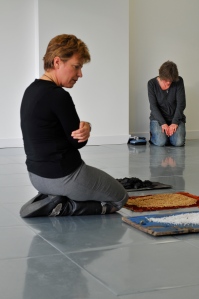Rhiannon Evans: personal statement
October 30, 2010 § 2 Comments
I am a visual artist working with participation and ritual.
I am currently investigating how differing forms of evidence of events or performances affect perceptions and experiences of an action …. (and vice versa).
I have a background in botanical sciences and sometimes this is made visible in my work.
Raquel Villar Perez: personal statement
October 30, 2010 § Leave a comment
I was born in 1983, in Valencia, Spain, inside a hard-working family: my grandparents, of an Andalusian origin, were land workers; my parents, also Andalusian, have worked in any kind of work they have could; my sister, Valencian, is social educator, and she works with mental disabled people; and me, I work in behalf of a retailer of vitamins, minerals and herbal supplements and in my leisure time I’m a cultural constructer based in London.
Recently I have got a MFA in Artistic Production by the Polytechnics University of Valencia, where I intend to continue studying a PhD program in art at the same time that I improve my knowledge in Sociology and Cultural Studies.
My artistic experience is characterised by an interest in social engagement, working directly with collectives experiencing social exclusion. Through these projects I have developed an ability to work with diverse social agents, and a capacity to motivate them and incite them to participate in the construction of a common goal. Among others, I have worked with sans papiers and inhabitants of marginalised neighbourhoods. My working experience has been developed principally in the self-taught management of my artistic practices and my participation as secretary and treasurer in AVVAC, Visual Artists Association of Valencia, Alicante and Castellón.
Alex Buhagiar: personal statement
October 30, 2010 § Leave a comment
Organisations and groups interest me – their values, aims and what helps them to function well – and my background in sociology and research finds its way into much of what I do.
I have been preoccupied for a long time with how to engage in a meaningful way with social/political issues. Linking ordinary, everyday activities with world events, and also involving people in a direct way, has been a way into this for me.
D Rosier: personal statement
October 30, 2010 § Leave a comment
For philosophers such as Kierkegaard, becoming more authentic meant organizing our lives around whatever we choose as our central meanings and purposes. Even if we cannot overcome ultimate absurdity and meaninglessness, we can always choose to live what we regard as worthy human lives.
Psychotherapy also makes the issue of authenticity central to its investigations and practices. Freud also believed that authenticity (although he never actually used the term) was an internal state, created by an integrated relationship with the self’s three components of id, ego and superego.
Contemporary psychotherapy similarly seeks to develop and strengthen a Core Self (or a minimum number of “selves”) as a means to authenticity, which is then little disturbed by external factors. We are codetermined and codetermining. Human agency remains a vital part of the dialectic that shapes (and deforms) human subjectivity (Burston).
By contrast, for Marx, as for Hegel before him, authenticity is not an internal phenomenon, but a social construction – generally, barely and rarely experienced under Capitalism. Authenticity, achievable only in an equal classless society, is turned on its head under Capitalism by its nemesis Alienation (i.e. loss of control, specifically the loss of control over labour).
My research explores both the internal and external aspects of authenticity, and its nemesis, alienation; and my practice contains elements of both the autobiographically and socially “real”.








